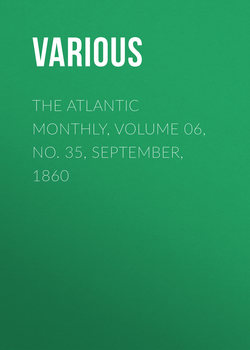The Atlantic Monthly, Volume 06, No. 35, September, 1860

Реклама. ООО «ЛитРес», ИНН: 7719571260.
Оглавление
Various. The Atlantic Monthly, Volume 06, No. 35, September, 1860
AMONG THE TREES
VICTOR AND JACQUELINE
VII
VIII
IX
X
XI
ON A MAGNOLIA-FLOWER
SOME NOTES ON SHAKSPEARE
THE GREAT ARM-CHAIR
THE SONG OF FATIMA
SOMETHING ABOUT HISTORY
MY NEIGHBOR, THE PROPHET
THE PILOT'S STORY
A DAY WITH THE DEAD
CULTURE
THE CHILDREN'S HOUR
THREE-MILE CROSS
THE PROFESSOR'S STORY
CHAPTER XVII
CHAPTER XVIII
REVIEWS AND LITERARY NOTICES
JULY REVIEWED BY SEPTEMBER
RECENT AMERICAN PUBLICATIONS
Отрывок из книги
In our studies of Trees, we cannot fail to be impressed with their importance not only to the beauty of landscape, but also in the economy of life; and we are convinced that in no other part of the vegetable creation has Nature done so much to provide at once for the comfort, the sustenance, and the protection of her creatures. They afford the wild animals their shelter and their abode, and yield them the greater part of their subsistence. They are, indeed, so evidently indispensable to the wants of man and brute, that it would be idle to enlarge upon the subject, except in those details which are apt to be overlooked. In a state of Nature man makes direct use of their branches for weaving his tent, and he thatches it with their leaves. In their recesses he hunts the animals whose flesh and furs supply him with food and clothing, and from their wood he obtains the implements for capturing and subduing them. Man's earliest farinaceous food was likewise the product of trees; for in his nomadic condition he makes his bread from the acorn and the chestnut: he must become a tiller of the soil, before he can obtain the products of the cereal herbs. The groves were likewise the earliest temples for his worship, and their fruits his first offerings upon the divine altar.
As man advances nearer to civilization, trees afford him the additional advantage which is derived from their timber. The first houses were constructed of wood, which enables him by its superior plastic nature, compared with stone, to progress more rapidly in his ideas of architecture. Wood facilitates his endeavors to instruct himself in art, by its adaptedness to a greater variety of purposes than any other substance. It is, therefore, one of the principal instruments of civilization which man has derived from the material world. Though the most remarkable works of the architect are constructed of stone, it was wood that afforded man that early practice and experience which initiated him into the laws of mechanics and the principles of art, and carried him along gradually to perfection.
.....
Having said these words, the face of the young man emerged wholly from the eclipse of the former shadow.
"What is this?" said the brave peasant from Domrémy, manifestly doubting whether she had heard aright; and her clear pure eyes were gazing full on Victor Le Roy, actually looking for an explanation of his words.
.....